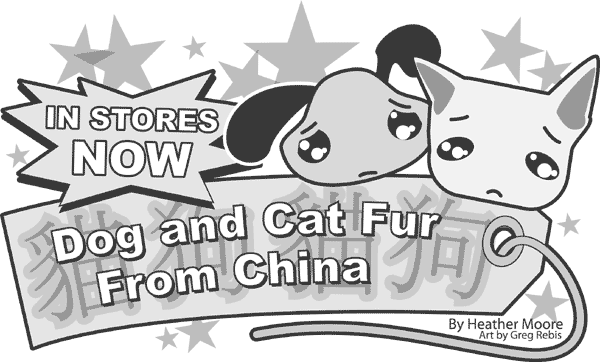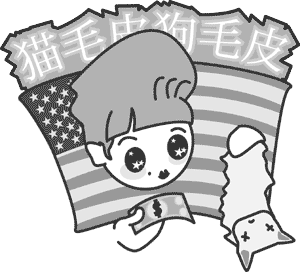Donate to IMPACT
Click below for info


• Dog & Cat Fur From China?!
• Quickies
(music reviews)
 • E-Mail Comments
• Archives
• Subscribe to IMPACT
• Where to Find
IMPACT
• Buy IMPACT T-Shirts
• Ordering Back Issues
• Home
|

The tag won't say tabby cat, Labrador Retriever, or German Shepard,
but some of the fur coats and fur-trimmed gloves, hats, and boots sold in popular retail stores in America may be made from dogs and cats who were killed in China in some of the most grisly ways imaginable. A recent investigation into the dog and cat fur trade has roused even the most complacent consumers to join the fight against fur and given animal rights activists more ammunition against an already immoral industry.
Chinese Animal Torture
In the summer of 2005, investigators from People for the Ethical Treatment of Animals (PETA) traveled to an animal market in Guangzhou in Southern China and found dogs and cats crammed in tiny wire-mesh cages, visibly exhausted. Many had been on the road for days with no food or water. Some were so lethargic, they could barely move. Others were aggressive and fought constantly, having been driven insane from confinement and exposure; they were covered in gaping wounds. Many animals slowly perished in their cages; dead bodies were piled on top of the cages. Some of the animals still had collars–a sign that they were once someone's beloved companions.
As many as 8,000 dogs and cats were loaded onto each truck in crowded cages stacked one on top of another. One by one, the cages were tossed from the top of the truck to the ground 10 feet below, often shattering the legs of the animals inside. The animals were lifted out with long metal tongs and thrown over a seven-foot fence to be killed and skinned. They were strangled with wire nooses, bludgeoned, hanged, boiled or bled to death. Many were still alive while their skins were peeled away.
Americans and Europeans Share the Blame
The fur stripped from these poor animals is often deliberately mislabeled as fur from another species and exported to other countries to be sold in retail stores. China supplies more than half of the finished fur garments imported for sale in the United States.
In November 2005, a spokesman for the Chinese ambassador in London told BBC News, "Though cats and dogs are not endangered, we do not encourage the ill treatment of cats and dogs... but, anyway, the fur trade mostly feeds markets in the U.S. and Europe. This fur is not consumed in China. So the Americans and Europeans should accept the blame... We have no plans to clamp down on this internally that I am aware of–it is for the U.S. and Europeans to take their own action. They should boycott fur as a fashion material."
J. Crew Stops Sellling Fur
Boycotts, protests, letter-writing campaigns and unrelenting pressure from animal rights advocates have consistently had an impact on fashion retailers. On November 30, 2005, after a highly publicized, 11-week long campaign led by PETA, J.Crew, one of the most popular youth retailers, announced that it would stop selling fur and fur-trimmed garments.
J.Crew had just started selling fur for the fall 2005 season. Much of it was imported from China. According to spokesman Owen Blicksilver, the company began pulling fur from its stores and catalog on Black Friday, the busiest shopping day of the year.
PETA's campaign had included nationwide demonstrations, dead flower deliveries, petitions, letters, and phone calls. Thousands of PETA's youth "Street Team" members contacted the company's CEO at home, and many long-time J.Crew customers returned their credit cards or demanded to be taken off the mailing list until the company stopped selling fur.
Publicly, J.Crew has claimed that its decision to stop selling fur had nothing to do with PETA's campaign and was made simply for "business reasons."
Fur-Free Fashion Chains
Many other popular clothing chains, including H&M, Gap Inc., Zara, Forever 21, Gadzooks 21, and abc distributing, LLC, a large online company based in Miami, have adopted fur-free policies.
Forever 21 announced its fur-free policy less than two weeks after PETA called for a nationwide boycott of the trend-setting chain. The company even donated 20 boxes of unsold fur shawls, wraps, and scarves to PETA, who worked with relief organization Life USA to send the furs to needy people in war-torn Afghanistan and earthquake-ravaged Pakistan.
Other top retailers, including American Eagle and Banana Republic, routinely opt not to sell fur items. Topshop, a highly respected chain in the United Kingdom, displayed PETA's "All Our Fur Is Fake" decal in the windows of its 280 stores in 2004 after British activists threatened to boycott the company for selling animal fur. Toronto fashion retailer Suzy Shier contacted PETA and pledged never to sell fur again after activists demanded that the store stop selling fur.
After an eight-month campaign against Wet Seal, PETA received written assurance that the company would not carry fur during the Fall 2005 season. PETA is meeting with Wet Seal officials in late-January 2006 to discuss a permanent fur-free policy.
Activists Urge J.Lo to Go Faux
 Animal advocates are also calling on Jennifer Lopez to stop using animal fur in her popular "Sweetface" and "J.Lo" clothing lines. The fur used in the J.Lo line is imported from China and may come from dogs and cats, or from minks, foxes, rabbits, raccoon dogs, and other fur-farmed animals who feel pain just the same.
Animal advocates are also calling on Jennifer Lopez to stop using animal fur in her popular "Sweetface" and "J.Lo" clothing lines. The fur used in the J.Lo line is imported from China and may come from dogs and cats, or from minks, foxes, rabbits, raccoon dogs, and other fur-farmed animals who feel pain just the same.
Care for the Wild International, Swiss Animal Protection, and EAST International conducted a year-long investigation into Chinese fur farms, and concluded that "conditions on Chinese fur farms make a mockery of the most elementary animal welfare standards."
Because there are no regulations governing fur farms in China, farmers can house and slaughter animals however they see fit. Fur-farmed animals pace and shiver in outdoor wire cages, exposed to driving rain, scorching sun, or freezing temperatures. Many languish with broken bones and other severe injuries. Those suffering from anxiety-induced psychosis chew on their own limbs and throw themselves repeatedly against the cage bars.
Before they are skinned alive, animals are pulled from their cages and thrown to the ground; workers bludgeon them with metal rods or slam them on hard surfaces, causing broken bones and convulsions, but not always immediate death. Many remain conscious while they are skinned and struggle to defend themselves to the very end.
When the fur is finally peeled off over the animals' heads, their naked, bloody bodies are thrown onto a pile. Some of the animals' hearts are still beating five to ten minutes after they are skinned. One investigator recorded a skinned raccoon dog on the heap of carcasses who had enough strength to lift his bloodied head and stare into the camera.
PETA has contacted Jennifer Lopez repeatedly and sent her video footage of animals being skinned alive in China, but she has to chosen to turn a blind eye to their suffering.
Make Change Happen
It is up to consumers and animal advocates to put a stop to the cruel fur trade. Because it is often difficult to determine a fur's country or species of origin, fur-wearers can never be certain whose skin they are in or what country it came from. Spread the word. Talk to store managers, pass out leaflets, do a school report or organize a protest at a store that sells fur.
Write a letter to the Chinese ambassador urging China to enact an animal welfare law that will stop the cruel handling of dogs, cats, and other animals at markets and during transportation:
His Excellency Zhou Wenzhong
Ambassador of the People's Republic of China
Embassy of the People's Republic of China
2300 Connecticut Ave. N.W.
Washington, DC 20008
202-328-2574, 202-328-2582 (fax)
e-mail: chinaembassy_us@fmprc.gov.cn
Tell Jennifer Lopez you're no fan of fur:
Jennifer Lopez c/o BWR
9100 Wilshire Blvd., 6th Fl. W.
Beverly Hills, CA 90212
Don't let Lopez profit from the animal's pain–boycott her movies, concerts, and merchandise. Visit her fan sites and let her admirers know what a bloody business she supports.
Do whatever you can to let others know that there is no excuse to wear fur–from any animal and any country.
American Fur Farms No Safe Haven
After watching heart-wrenching video footage and reading graphic descriptions of the Chinese fur industry, it's easy to think, "those barbarians, how can they be so sadistic?" But lest we forget, Americans also do despicable things to animals. No federal humane slaughter law protects animals on U.S. fur factory farms, and killing methods are quite gruesome.
Small animals may be crammed into boxes and poisoned with hot, unfiltered engine exhaust from a truck. Engine exhaust is not always lethal so animals sometimes wake up while being skinned. Larger animals have clamps or a rod applied to their mouths and rods inserted into their anuses, and they are painfully electrocuted. Other animals are poisoned with strychnine, which suffocates them by paralyzing their muscles in painful rigid cramps. Gassing, decompression chambers, and neck snapping are other common fur-farm slaughter methods.
Cruelty knows no borders. Fortunately, neither does compassion. A list of companies that offer cruelty-free clothing can be found in "PETA's Shopping Guide to Compassionate Clothing" on CaringConsumer.com.
| |
•
Heather Moore is a staff writer for People for the Ethical Treatment of Animals (PETA) and is a regular contributor to IMPACT press.
Email your feedback on this article to editor@impactpress.com.
Make an IMPACT
Other articles by Heather Moore:
|




 Animal advocates are also calling on Jennifer Lopez to stop using animal fur in her popular "Sweetface" and "J.Lo" clothing lines. The fur used in the J.Lo line is imported from China and may come from dogs and cats, or from minks, foxes, rabbits, raccoon dogs, and other fur-farmed animals who feel pain just the same.
Animal advocates are also calling on Jennifer Lopez to stop using animal fur in her popular "Sweetface" and "J.Lo" clothing lines. The fur used in the J.Lo line is imported from China and may come from dogs and cats, or from minks, foxes, rabbits, raccoon dogs, and other fur-farmed animals who feel pain just the same.